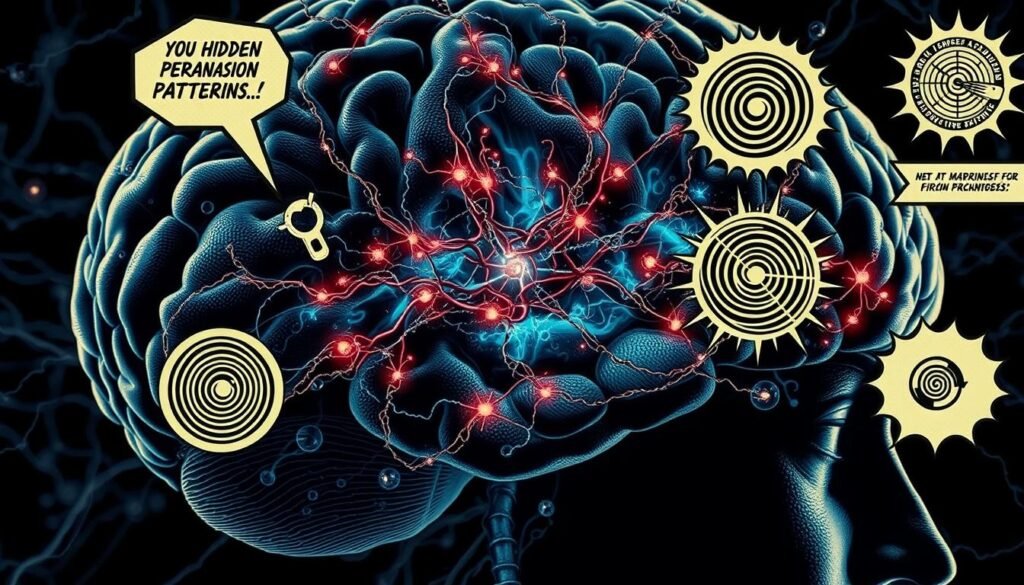When Superpowers Go Too Far: The Ethics of Controlling Minds

Imagine if your mind could be both your strongest ally and your biggest weakness. In comic books, ethical mind control powers show us a world where our thoughts are not always our own. They make us question what it means to be free and in control.
Comic books have always been about more than just action and adventure. They explore the moral side of having mental powers. These stories make us think about the fine line between controlling someone’s mind and keeping them safe.
Meet characters like Xavier from the X-Men. They face tough choices because of their powers. These stories teach us about the big responsibility that comes with having special mental abilities.
This journey will make you see mental powers in a new light. Comic book creators use these stories to ask big questions. They want us to think about consent, our own power, and the limits of controlling someone’s mind.
Understanding Mind Control Powers in Comic Book Universe
Explore the world of psychic abilities in comics, where mental powers change how stories are told. Comic book universes dive into mind control powers, showing us amazing mental skills. These skills challenge what we think humans can do.
Mind manipulation in superhero stories is a deep dive into psychology. Characters with mental powers are more than just special abilities. They raise big questions about our minds and what’s right and wrong.
Types of Mental Manipulation Abilities
Mental powers in comics include several types:
- Telepathy: Direct communication through thoughts
- Hypnosis: Controlling actions through suggestion
- Memory manipulation: Altering or erasing personal recollections
- Emotional influence: Redirecting feelings and psychological states
Historical Evolution in Comics
The idea of psychic abilities in comics has changed a lot since the 1950s. At first, mental powers were simple plot tools. Now, they show complex psychological stories.
“With great mental power comes great psychological responsibility” – Comic Book Wisdom
Notable Characters with Mind Control Powers
Some characters have made a big impact on how we see mental powers:
- Professor X from X-Men: Quintessential telepath
- Jean Grey: Powerful psychic with complex moral challenges
- Purple Man: Controversial villain demonstrating psychological manipulation
These characters show how mind control powers can make stories deep and thought-provoking. They make us think about the ethics of controlling minds.
The Moral Philosophy Behind Mental Powers
Comic books that explore mental powers dive into deep moral issues. They make us think about free will and personal freedom. The idea of mind control in stories sparks interesting debates on power, consent, and what’s right and wrong.

Characters with mental powers face big ethical questions. These questions are similar to ones we face in real life. They make us think about:
- Individual rights and personal boundaries
- Consent in mental interactions
- Responsible use of psychological influence
- Potential for both heroic intervention and destructive manipulation
The ethics of mental powers go beyond simple good vs. evil stories. They make us see the world in a more complex way. They make us think about power, personal choice, and the moral choices characters make.
| Mental Power Type | Ethical Considerations | Potential Consequences |
|---|---|---|
| Telepathy | Privacy invasion | Psychological trauma |
| Mind Control | Removing personal choice | Loss of individual identity |
| Memory Manipulation | Altering personal history | Existential crisis |
Understanding these powers needs deep psychological study. Comic creators use these powers to explore deep questions about us. They look into human nature, power, and personal freedom.
Mental powers in comics are never just about supernatural abilities—they’re a mirror reflecting our deepest ethical challenges.
Comics turn complex ideas into stories that grab our attention. They make us think about tough moral issues in a way that feels real.
Heroes vs. Villains: Breaking the Mind Control Stereotype
Comic book stories are changing how we see mind control. The old idea that mind control is always bad is fading. It’s making us rethink what mental powers really mean.
Today’s writers are showing mind control in new ways. They’re making it more than just good vs. evil. They’re diving into the minds of characters, showing us their true depths.
Challenging Preconceived Notions
People with mind control powers aren’t just bad guys anymore. Writers are showing they can be heroes too. This change is big for comic books.
- Mental powers can be tools for understanding, not just manipulation
- Characters demonstrate ethical use of psychological abilities
- Redemption arcs showcase personal transformation
Case Study: Shinso’s Transformative Journey
Shinso from My Hero Academia is a great example. He was seen as different because of his mind control. But he shows us how people can grow and change.
Breaking Down Mental Power Prejudices
Comic creators are fighting against old ideas about mental powers. They’re making characters with these powers seem real and complex. This makes us think differently about mind control.
“Power is not inherently good or evil – it’s how we choose to use it that defines us.”
Ethical Mind Control Powers Comics: Examining the Good Side
Modern comic books are using telepathy in new ways. They show how mind control can be used for good. Characters with telepathic powers are now seen as heroes who face tough moral choices.
Comic writers are pushing the limits of storytelling with mental powers. They show how these abilities can help and protect, not just harm.
- Preventing psychological trauma
- Resolving conflicts without physical violence
- Supporting mental health interventions
- Creating empathetic connections between individuals
The best stories about mind control focus on respect and consent. Telepathic characters who respect boundaries are powerful symbols of responsible use of mental powers. They show how mental abilities can help us understand and heal, not control.
“With great mental power comes great responsibility” – Modern Comic Hero Philosophy
Exploring these comics helps us understand mental powers better. The best stories turn mind control into a force for good. They make us think differently about using telepathy.
Responsible Use of Mental Abilities in Superhero Stories
Comic books often explore the ethics of psychic powers. Characters with telepathic abilities face big moral challenges. They must balance their powers with personal freedom and responsibility.
- Always respect free will
- Keep psychological interference to a minimum
- Only use powers for protection or direct action
- Always get consent before using mental tricks
Establishing Ethical Boundaries
Telepathic heroes need strict rules for themselves. They must create personal codes to avoid misuse of their powers. This helps keep trust with the people they protect.
Consent and Personal Autonomy
Comic book creators stress the need for consent in mental powers. Using telepathy responsibly means respecting others’ mental privacy and choices.
Limitations of Mental Intervention
Mental tricks, even with good intentions, can harm deeply. Superhero stories show the dangers of unauthorized mind control. Characters must think hard about the effects of their actions.
The Psychology of Mind Control in Comic Narratives

Comic books have always explored the mind control theme deeply. They dive into how mental manipulation works in superhero stories. These themes are more than just plot points. They give us a peek into human thoughts and how we interact with each other.
The idea of mind control in fiction is like a mirror to our real world. Writers use stories to talk about big psychological ideas. They cover topics like:
- The nature of personal identity
- Boundaries of individual autonomy
- Power dynamics in social interactions
- Psychological vulnerability to external influences
Mind control in superhero tales shows us interesting psychological tricks. Characters with mind powers help us think about big questions. They make us wonder about free will, consent, and our own power.
Comic makers use mind control stories to show us real-life issues. They show how subtle mind tricks happen in our world. From media to social engineering, these stories make us think about our own mind control.
Comic stories turn mind control into a deep look at human weakness and strength.
Getting into the psychology behind mind control makes it more than just a plot point. It’s a way to explore the deepest parts of human experience and how we interact with each other.
Justice League and Mind Control Dilemmas
The world of comics often makes us think about the moral sides of mind control. In the Justice League’s world, heroes face big ethical choices. These choices test the limits of personal rights and the need to protect everyone.
Superhero stories often deal with tough decisions that make us question what’s right. The Identity Crisis storyline is a great example of these complex issues.
Unraveling the Memory Manipulation Controversy
Batman’s response to memory erasure shows the deep ethical problems of mental control. The moral sides of mental powers are clear when heroes themselves are affected by memory tampering.
- Memory erasure challenges personal autonomy
- Superhero protection conflicts with individual rights
- Ethical boundaries become blurred in crisis situations
Protection vs. Personal Sovereignty
The Justice League’s actions make us think about consent and protection. When is it okay to take away someone’s free will for the greater good? These comics show the thin line between being a hero and crossing personal boundaries.
The greatest threat to freedom is not evil, but well-intentioned manipulation.
The debate on mental powers in comics touches on real-life issues like privacy and consent. It shows how superhero stories can lead to deep thoughts on ethics and protection.
Creating Positive Change Through Mental Powers
Graphic novels have moved beyond simple mind control. Now, they show mental powers as tools for healing and growth. Characters with telepathy help bring people together, fostering understanding.
Today, writers focus on using telepathy wisely in stories. They create characters who see their powers as a way to connect and empathize, not control.
- Therapeutic interventions using mental powers
- Conflict resolution through psychological understanding
- Breaking down communication barriers
- Healing collective trauma
Protagonists in graphic novels show the good side of mental powers:
| Mental Power Application | Positive Outcome |
|---|---|
| Emotional Telepathy | Promoting Mutual Understanding |
| Memory Reconstruction | Trauma Recovery |
| Psychological Mediation | Conflict Resolution |
Comics are changing how we see mental powers. They show the power of empathy and understanding. This challenges readers to think deeply about these ideas.
Modern Interpretations and Future Implications
Recently, comics about ethical mind control have changed a lot. Now, graphic novels tell deeper, more complex stories. They move away from simple good vs. evil battles, diving into the mind’s depths.
Today’s comic makers are breaking new ground. They create stories that show the moral dilemmas of mental powers. Characters are more than just heroes or villains; they have rich inner lives.
- Exploring gray areas of mental power ethics
- Challenging traditional superhero narrative structures
- Introducing more realistic psychological consequences
As you read comics, you’ll see a shift in how mind control is shown. The future of comics looks bright, with creators aiming to:
- Explore characters’ minds more deeply
- Use consent in their stories
- Show the real effects of mind control
Comics are becoming more careful in how they tell stories. They focus on characters’ choices and freedom. Mental powers are no longer just plot tools. They’re deep explorations of human thoughts and ethics.
The evolution of mind control narratives reflects our growing understanding of psychological complexity and personal boundaries.
Comic books are getting better at showing mind control. This change will make us see mental powers in stories in a new light.
Conclusion
As you’ve explored the world of ethical mind control powers in comics, you’ve seen the deep moral lessons. These stories go beyond simple superhero tales. They show us how special powers can make us think about freedom, consent, and personal space.
Comic books use mental powers to talk about real-life ethical issues. Characters like Professor X from X-Men show us that mind control is about understanding and talking, not just controlling others. These stories make us think about the balance between personal freedom and the good of all.
Comic book creators have turned mental powers into deep thinking tools. They make us think about power, responsibility, and what we can do. They ask us to think about how special powers can help, heal, and bring people together.
Your journey through these comic book worlds shows us what true heroism is. It’s not just about having power. It’s about using it wisely, with kindness and respect. The best stories teach us that with empathy and care, mental powers can change us and the world for the better.
FAQ
Q: What are mind control powers in comics?
A: In comics, mind control powers let characters control others’ thoughts and actions. These powers can range from simple suggestions to full control. They add depth to stories and raise big questions about right and wrong.
Q: Are mind control powers always portrayed as villainous?
A: No, today’s comics show a different side. They explore how some use these powers for good. This includes healing and solving conflicts, showing a more balanced view.
Q: How do comics address the ethical concerns of mind control?
A: Comics deal with ethics by making characters face tough choices. They create rules and consequences for using these powers. This makes for interesting stories that make us think.
Q: Can mind control powers be used for good?
A: Yes, comics show how these powers can help. They can prevent fights, heal emotional wounds, and help people understand each other better. It’s a positive side of these abilities.
Q: Who are some notable characters with mind control powers?
A: Famous characters include Professor X from X-Men and Jean Grey. There’s also Purple Man and Shinso from My Hero Academia. They all challenge old ideas about good and evil.
Q: How have mind control powers evolved in comic book storytelling?
A: These powers have grown from simple tricks to deep story tools. They help explore identity, consciousness, and free will. Comics now tackle real issues like manipulation and influence.
Q: What psychological themes do mind control stories explore?
A: These stories dive into big ideas like personal freedom and identity. They also look at consciousness and what’s right and wrong. It’s a way to talk about real issues in a safe space.
Q: Are there guidelines for ethical use of mental powers in comics?
A: Many comics have rules for using these powers. They focus on consent, helping, and personal ethics. Characters often struggle with these rules, making for engaging stories.
Q: How do comics balance the potential dangers of mind control?
A: Comics show the risks by adding consequences and moral dilemmas. Characters face their own limits and the weight of their powers. It’s a way to make readers think about power and choice.
Q: What makes mind control such a compelling storytelling device?
A: Mind control is fascinating because it lets us explore human nature. It makes us think about free will, personal control, and power. It’s a powerful tool for telling complex stories.









